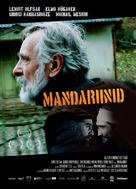Reviews provided by RottenTomatoes
Farran Smith Nehme, New York Post: The film telegraphs its pacifist message early on, but it's still deeply affecting. Read more
Adam Nayman, AV Club: The shift from philosophical parrying to actual combat doesn't make Tangerines more compelling; on the contrary, it suggests that the filmmakers didn't have the confidence to tell their story without falling back on genre tropes. Read more
J. R. Jones, Chicago Reader: Writer-director Zaza Urushadze turns this fragile premise into a superior chamber drama. Read more
Peter Rainer, Christian Science Monitor: There are some touching interactions between the players, but the film's humanism is too predictably calibrated. Read more
Joe McGovern, Entertainment Weekly: Tangerines, the first Estonian picture nominated for the foreign-film Oscar, has a heart as ripe as the citrus fruit of its title, but its message doesn't yield much juice. Read more
Stephen Farber, Hollywood Reporter: Although the subject of civil war within the former Soviet countries has been tackled in other movies, this retelling is one of the most concise and affecting. Read more
Kenneth Turan, Los Angeles Times: "Tangerines" is an example of lean, unadorned old-school filmmaking where familiar style and technique combine to unexpectedly potent effect because of the great skill with which they've been employed. Read more
Sam Eifling, The New Republic: The cinema, so infatuated with loud bangs and flowering orange blasts, does, as Ivo says, cheat us. Director/writer Zaza Urushadze instead gives us a clever, claustrophobic plot befitting a three-act play. Read more
Bob Mondello, NPR: Tangerines becomes an object lesson in the resilience of ancient animosities, and the limits, sadly, of common sense. Read more
Tomas Hachard, NPR: Because the conflict between Abkhazians and Georgians is so sketchily drawn, the ultimate heartwarming tone of the film seems not so much unearned as unspectacular. Read more
A.O. Scott, New York Times: "Tangerines" is a modest film, sure of its proportions and clear about its intentions. The key to its effectiveness lies with the actors ... Read more
Tom Keogh, Seattle Times: It is difficult not to be moved by "Tangerines," which begins to feel like a legend despite one's nagging sense something is missing from the film's hasty third act. Read more
David Lewis, San Francisco Chronicle: Though the themes about war and peace will be familiar, this is good, old-fashioned storytelling - with a high level of craftsmanship. Read more
Colin Covert, Minneapolis Star Tribune: The acting is solid; Ulfsak is ideally cast as the easygoing, timeworn woodworker. Read more
Inkoo Kang, TheWrap: It might be willfully naive, but it also successfully argues that the path to peace begins with a laying down of not only guns, but also cynicism and distrust. Read more
David Ehrlich, Time Out: Urushadze's excellent cast imbues their thinly drawn characters with a great deal of life, but the roles are so transparent that the film feels like more of an advertisement for peace than it does an argument for it. Read more
Marsha McCreadie, Village Voice: Small in scale if huge in heart and scope, Tangerines uses four characters to limn the religio-nationalistic hostilities unleashed by the dissolution of the Soviet Union in 1992. Read more
Michael O'Sullivan, Washington Post: Georgian writer-director Zaza Urushadze avoids histrionics or moralizing, relying on a strong cast that expresses the film's central argument about war's absurdity largely through taciturn action, not words. Read more
Joe Morgenstern, Wall Street Journal: This remarkable piece of antiwar cinema honors its theme, and the movie medium. Read more

